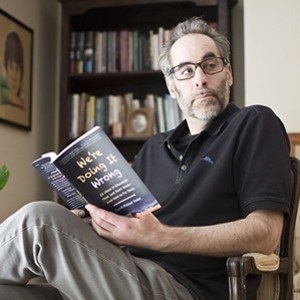David Michael Slater is the author of the new novel The Vanishing. His many other books include Dictionaries Out of Order. He lives in Reno, Nevada.
Q: What inspired you to write The Vanishing, and how did you create your character Sophie?
A: The Holocaust is present, directly or indirectly, in several of my books, and it plays different roles in each of them.
In The Vanishing, I didn't set out to say anything specific about it, but began the book simply because it occurred to me that an invisible person trapped in those horrors would make for a compelling character and story. So Sophie evolved organically, taking shape as she (and I) discovered how she reacted to each new horror she encountered.
Q: In your Author's Note, you write, “My goal was not to dramatize any specific historical records but, rather, to communicate in a unique way the emotional realities, as I imagine them, of life during Hitler’s reign of terror.” Did you do much research to write the book, and what did you see as the right balance between fact and fiction?
A: I'm not a Holocaust scholar, but I have been exposed to Holocaust education for most of my life. This book depicts much of what embedded itself into my mind over the years--mostly the intentional dehumanization process the Nazis knowingly inflicted on their victims and the incredible resistance to it.
I did research (and had some research help) when I needed details that would be accurate to the locations Sophie found herself in. I also tried to depict only things that, if they didn't happen exactly the way I wrote about them, happened in very similar ways.
Q: Professor Michael Berenbaum said of the book, “The Vanishing is a serious, powerful, and insightful exploration of the Holocaust that, using elements of fantasy, takes readers places that no memoir ever could.” What do you think of that assessment?
A: I'm humbled and honored by Professor Berenbaum's reaction, and the reaction of many other Holocaust scholars and educators so far.
To be honest, I was afraid that the tinkering I did with the timeline and locations in the book would not go over well, as they haven't in some other Holocaust novels. It's extremely gratifying that the risks I took injecting an element of fantasy into a story about this solemn subject seem to have paid off.
Q: What do you hope readers take away from the book?
A: I don't write books hoping for any specific takeaways, but I'm thrilled to hear from our early readers that they were profoundly moved by the story, that they'd fallen in love with Sophie, and felt simultaneously devastated and uplifted by her story.
And if this book inspires anyone who knows little or nothing about the Holocaust to look into the facts for themselves, I'd feel blessed to be their conduit.
Q: What are you working on now?
A: I'm always working on multiple projects. At the moment: a new picture book series with Jay Lender (of SpongeBob fame); a new early chapter book series called The Super Doopers; an adult novel called Ugly; and a musical, Shocked, about the Milgram Shock Experiments, with composer/lyricist Ernest Ebell.
Q: Anything else we should know?
A: That I'm grateful for your review! Readers can learn more at www.davidmichaelslater.com.
--Interview with Deborah Kalb


No comments:
Post a Comment